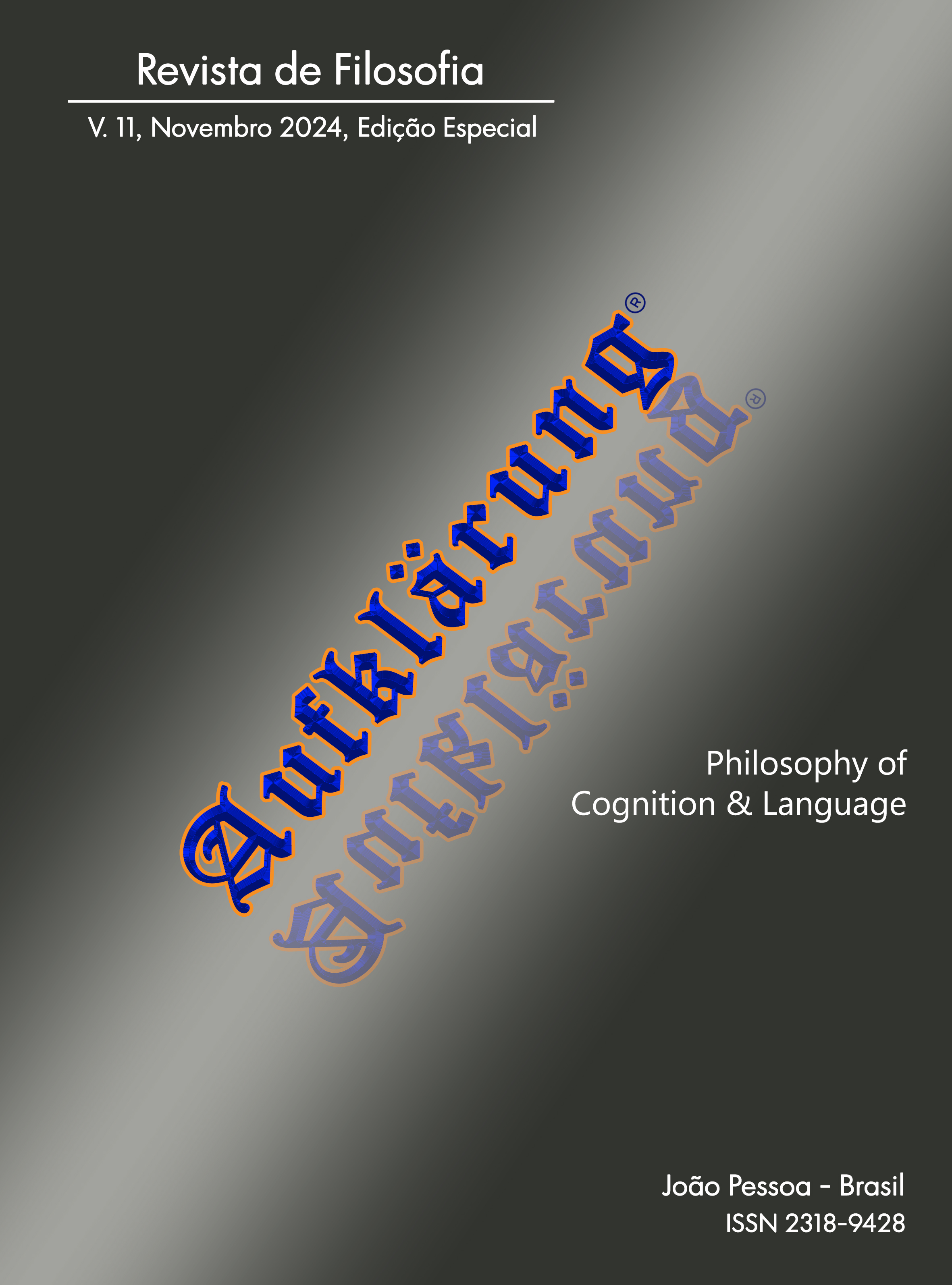O problema da troca de assunto na abordagem austera de Herman Cappelen da engenharia conceitual
DOI:
https://doi.org/10.18012/arf.v11iEspecial.70029Palavras-chave:
Engenharia Conceitual, Ética conceitual, Mudança de assunto, Disputas verbaisResumo
Este artigo examina o problema da troca de assunto na engenharia conceitual, focando na abordagem austera de Herman Cappelen. Apresentamos duas versões do problema: a objeção das disputas verbais e a objeção da instabilidade de conteúdo. Analisamos como Cappelen responde a essas objeções usando as noções de "assunto" e "similaridade de assunto". Argumentamos que, embora sua resposta à objeção das disputas verbais seja satisfatória, sua abordagem falha ao lidar adequadamente com a objeção da instabilidade de conteúdo. Especificamente, Cappelen não fornece recursos suficientes para identificar o conteúdo incompatível que fundamenta desacordos substantivos em casos envolvendo termos revisados. Concluímos que a abordagem austera de Cappelen, apesar de suas contribuições, deixa questões importantes sem resposta sobre como caracterizar desacordos legítimos em contextos de engenharia conceitual.
Downloads
Referências
ABATH, A. J. Para velhas perguntas, novas e melhores respostas: da engenharia conceitual ao aprimoramento erotético. Trans/Form/Ação, v. 46, p. 103-134, 2023.
BELLERI, D. Downplaying the change of subject objection to conceptual engineering. Inquiry, ahead of print, p. 1-24, 2021.
BELLERI, D. “You’re changing the subject”: an unfair objection to conceptual engineering?. Philosophical quarterly, ahead of print, p. 1-24, abr, 2024.
BELLERI, D. Engenharia conceptual. In: SANTOS, R.; YATES, D. (Org.) Compêndio em Linha de Problemas de Filosofia Analítica. Lisboa: Universidade de Lisboa, 2022. p. 01-32.
CAPPELEN, H.; DEVER, J. Context and communication. Oxford: Oxford University Press, 2016.
CAPPELEN, H.; PLUNKETT, D. Introduction. Conceptual engineering and conceptual ethics. in: BURGESS, A.; CAPPELEN, H.; PLUNKETT, D. (Ed.) Conceptual engineering and conceptual ethics. Oxford: Oxford University Press, 2020. p. 01-34.
CAPPELEN, H. Conceptual engineering: the master argument. In: BURGESS, A.; CAPPELEN, H.; PLUNKETT, D. (Ed.) Conceptual engineering and conceptual ethics. Oxford: Oxford University Press, 2020. p. 132-151.
CAPPELEN, H. Fixing language. Oxford: Oxford University Press, 2018.
CARNAP, R. Logical foundations of probability. Chicago: University of Chicago Press, 1950.
CHALMERS, D. J. Verbal disputes. Philosophical Review, v. 120, p. 515-566, 2011.
CLARK, A.; CHALMERS, D. The extended mind. Analysis, v. 58, p. 7-19, 1998.
DORR, C.; HAWTHORNE, J. Semantic plasticity and speech reports. The Philosophical Review, v. 123, p. 281-338, 2014.
DOS SANTOS, C. Comentário a “Para velhas perguntas, novas e melhores respostas: da engenharia conceitual ao aprimoramento erotético”: de conceitos a perguntas, de perguntas a conceitos. Trans/Form/Ação, v. 46, p. 141-146, 2023.
EVANS, G. The causal theory of names. Aristotelian Society, v. 47, p. 187-225, 1973.
HASLANGER, S. Gender and race: (what) are they? (What) do we want them to be? Noûs, v. 34, p. 31-55, 2000.
ISAAC, M. G.; KOCH, S.; NEFDT, R. Conceptual engineering: A road map to practice. Philosophy Compass, v. 17, n. 10, p. 1-15, 2021.
HASLANGER, S. Going on, not in the same way: conceptual engineering and conceptual ethics. In: BURGESS, A.; CAPPELEN, H.; PLUNKETT, D. (Ed.) Conceptual engineering and conceptual ethics. Oxford: Oxford University Press, 2020. p. 230-260.
KNOLL, V. Topics, disputes and “going meta”. Inquiry, ahead of print, p. 1-29, 2021.
MOREIRA, F. G. A. Comentário a “Para velhas perguntas, novas e melhores respostas: da engenharia conceitual ao aprimoramento erotético”. Trans/Form/Ação, v. 46, p. 135-140, 2023.
PINDER, M. Conceptual engineering, metasemantic externalism and speaker-meaning. Mind, v. 130, p. 141-163, 2021.
PLUNKETT, D. Which concepts should we use? Metalinguistic negotiations and the methodology of philosophy. Inquiry, v. 58, p. 828-874, 2015.
PLUNKETT, D.; SUNDELL, T. Disagreement and the semantics of mormative and evaluative terms. Philosopher’s Imprint, v. 13, p. 1-37, 2013.
PLUNKETT, D.; SUNDELL, T. Metalinguistic negotiation and speaker error. Inquiry, v. 64, p. 142-167, 2021.
SAWYER, S. The role of concepts in fixing language. Canadian Journal of Philosophy, v. 50, p. 555-565, 2020.
SCHROETER, F.; SCHROETER, L; TOH, K. The limits of metalinguistic negotiation: the role of shared meanings in normative debate. Canadian Journal of Philosophy. v. 58, p. 180-196, 2022.
STRAWSON, P. F. Carnap’s views on conceptual systems versus natural languages in analytic philosophy. In: SCHILPP, P. A. (Ed.) The philosophy of Rudolf Carnap. La Salle, IL: Open Court, 1963. p. 503-518.
SUNDELL, T. Changing the subject. Canadian Journal of Philosophy, v. 50, p. 580-593, 2020.
VERMEULEN, I. Verbal disputes and the varieties of verbalness. Erkenntnis, v. 83, p. 331-348, 2017.
Arquivos adicionais
Publicado
Como Citar
Edição
Seção
Licença

Este trabalho está licenciado sob uma licença Creative Commons Attribution 4.0 International License.
Política de Direito Autoral para os itens publicados pela Revista:
1.Esta revista é regida por uma Licença da Creative Commons aplicada a revistas eletrônicas. Esta licença pode ser lida no link a seguir: Creative Commons Attribution 4.0 International (CC BY 4.0).
2.Consonante a essa politica, a revista declara que os autores são os detentores do copyright de seus artigos sem restrição, e podem depositar o pós-print de seus artigos em qualquer repositório ou site.
Política de Direito de Uso dos Metadados para informações contidas nos itens do repositório
1. Qualquer pessoa e/ou empresa pode acessar os metadados dos itens publicados gratuitamente e a qulquer tempo.
2.Os metadados podem ser usados sem licença prévia em qualquer meio, mesmo comercialmente, desde que seja oferecido um link para o OAI Identifier ou para o artigo que ele desceve, sob os termos da licença CC BY aplicada à revista.
Os autores que têm seus trabalhos publicados concordam que com todas as declarações e normas da Revista e assumem inteira responsabilidade pelas informações prestadas e ideias veiculadas em seus artigos, em conformidade com a Política de Boas Práticas da Revista.






































